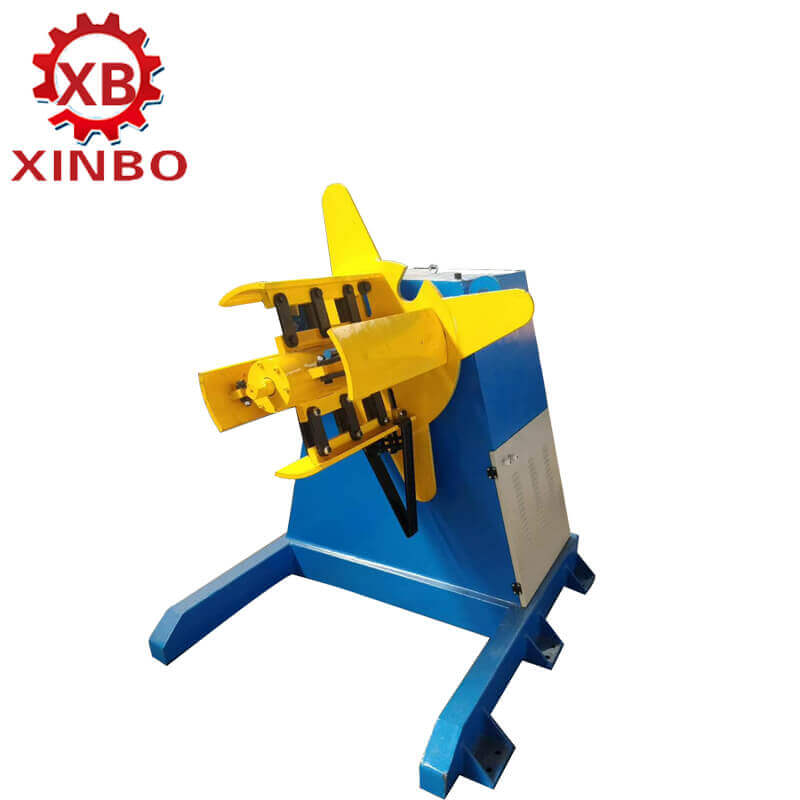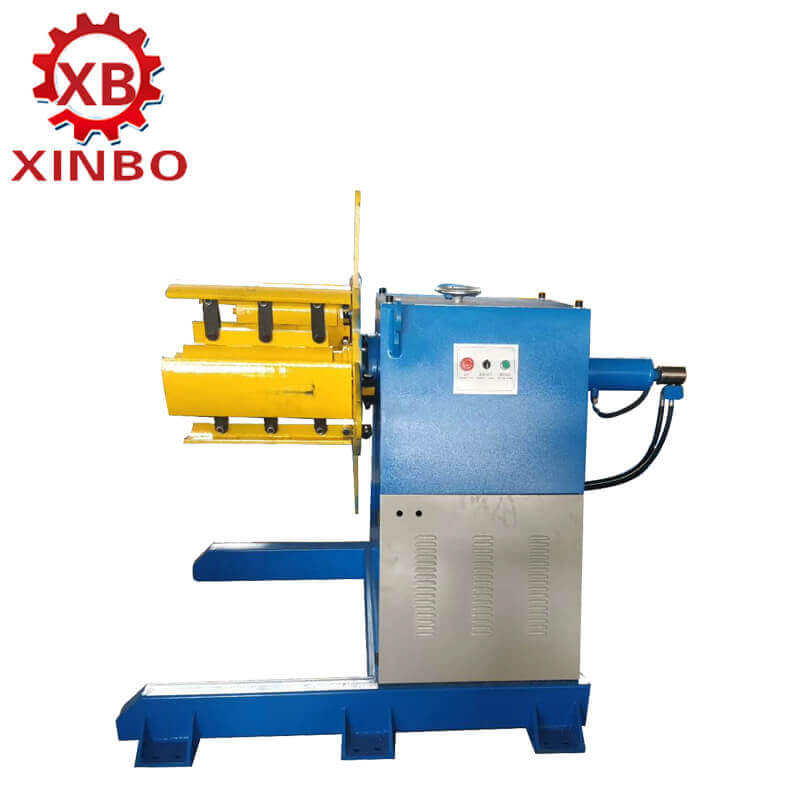Good quality
XinBo machine making CO. LTD is a professional manufacturer and exporter in roll forming machine,
VIEW MORE→Hydraulic decoilers are essential components in roll forming machines, playing a critical role in the production line of various metal components. They facilitate the unwinding of coil material, ensuring that the metal sheets are fed smoothly into the forming machinery. By using hydraulic mechanisms, these decoilers handle the heavy weights of metal coils while minimizing the manual labor required. This modern technology enhances the efficiency of production processes across various industries, including automotive, construction, and manufacturing.

The hydraulic unwinder plays a role, in the manufacturing process by preparing materials for further processing steps in the production line smoothly and efficiently. It is responsible for maintaining tension and stability for the coils to ensure they are unraveled at a controlled pace. This regulated feeding process is crucial for preserving the quality of the material and preventing problems like distortion or creasing due, to mishandling. Moreover, the hydraulic decoiler has the flexibility to accommodate coil dimensions and weights which makes it an adaptable option, for manufacturers dealing with a variety of materials.
One key role of a decompiler is to manage materials in a safe manner. The machine is designed to hold metal coils in place for unwinding purposes. This stability is crucial when dealing with coils that might tip over or fall down risking damage, to the materials and the safety of workers. The hydraulic mechanism enables changes in both height and angle to ensure that the coils are positioned correctly for the roll-forming machine while reducing the necessity, for adjustments.
The effectiveness of the feeding system is another benefit of decompilers. Hydraulic de-coilers use control to ensure a controlled material flow, into the production line. Consistent feeding helps to reduce interruptions and maintain production rates to meet production deadlines. Furthermore, the hydraulic decoiler eases the burden, on the operator who would otherwise have to maneuver coils through the manufacturing process. Automating this material handling task enables companies to boost efficiency and cut down on labor expenses.
Hydraulic decoilers not only perform their tasks but also include additional features that boost their effectiveness even more. These enhancements such, as tension control systems and automatic loop controls improve the feeding process by ensuring accuracy and reliability. The added components not only enhance efficiency but also play a role, in elevating the quality of the end results. For example, maintaining tension helps prevent defects from arising during roll forming resulting in final products that meet industry requirements.
In settings, with high manufacturing volume requirements that prioritize speed and efficiency automatic hydraulic decoilers come into play. These systems autonomously manage variables like coil feed rate and tension enabling uninterrupted operation sans supervision. By lessening involvement these automatic decoilers contribute to error and inconsistency reduction in the manufacturing process. They prove advantageous, for manufacturers aiming to expand operations and enhance output without compromising product quality.

In manufacturing environments or situations requiring flexibility manual hydraulic decoilers are commonly used while they may need input, from operators compared to automatic options they provide the advantage of being adaptable, to different production needs operators can adjust the unwinding process based on the coil’s specific properties which are beneficial when working with distinctive materials or specialized items With the work required to operate them manually several manufacturers continue to rely on hydraulic decoilers, for their production requirements due, to their dependability.
Choosing the decoiler involves considering its capacity and how well it works with your current roll-forming machines is key, to a smooth operation. You have to make sure that the decompiler’s capacity matches the weight and size of the coils you’ll be using in production. This is important for efficiency and reliability. For instance; if you’re dealing with coils in your manufacturing process. You’ll need a decompiler that can handle those weights effectively to ensure everything runs smoothly. Moreover making sure that your decompiler is compatible, with roll-forming machines will help in delivering materials at the rates and tensions. Ultimately leading to a more efficient production process.
Moreover, it is crucial to consider the dimensions of the coils undergoing processing. Numerous hydraulic decoilers offer adjustability to cater to coil widths and diameters thereby increasing their adaptability, in manufacturing settings. Experts in the industry should conduct an evaluation of both the decompiler and the roll-forming equipment specifications to streamline integration and prevent congestion, in production setups. By grasping these intricacies manufacturers can make decisions that meet their requirements effectively.
It’s crucial to incorporate a decompiler, into the production line to keep operations running smoothly without any breaks in the flow of work. Arranging the decoiler within the workflow can greatly boost productivity by allowing it to supply materials directly to the roll-forming machine without any disruptions. The layout of the production facility is a factor, in ensuring integration as it’s important to organize pathways and working areas efficiently.
Incorporating automation and control systems, in the integration process is crucial when setting up a production line effectively. For instance, hydraulic decoilers may include functionalities like sensor feedback and programmable interfaces allowing for, on-the-fly adjustments and enhanced feed optimization. These advancements do not boost productivity. Also, elevate monitoring and upkeep capacities thereby prolonging the lifespan of the machinery. Through this integration, a seamless manufacturing atmosphere is established where all elements function in unison ultimately bolstering production efficiency further.
Over time XINBO has become a player, in creating decoiler solutions by integrating advanced technologies to improve the performance of their products. Their focus on innovation aims to enhance reliability and efficiency while keeping expenses low. By incorporating automation, into their decoilers they can make adjustments that adapt instantly to production needs ensuring a steady coil feeding process even during peak demand times.
XINBOs hydraulic decoilers integrate technology to offer manufacturers valuable analytics and diagnostic capabilities, for improved equipment monitoring and proactive maintenance management to minimize downtime efficiently. Moreover, XINBO’s dedication, to using top-notch materials and precise engineering guarantees that their decoilers excel in demanding production settings while delivering performance.
User-friendliness plays a role, in designing decoilers since they are often used in fast-paced settings where quick setup and minimal interruptions are key factors to consider. XINBOs hydraulic decoilers feature user controls that make operation easy for employees of all skill levels by offering functionalities. This focus, on ensuring a user experience not only improves operational efficiency but also helps minimize mistakes during production.
Furthermore, the maintenance process is made thanks, to well-thought-out engineering techniques in place. The design of the decoilers allows for access to parts making routine inspections simple and reducing repair time considerably. The easy-to-use layout ultimately enhances the efficiency of the production process allowing manufacturers to concentrate on productivity rather than dealing with equipment problems.
Overall hydraulic unwinders are essential, for improving production processes in the roll-forming sector. By grasping their roles and advantages choosing systems thoughtfully and embracing advancements from manufacturers such, as XINBO companies can notably boost their operational effectiveness and output quality.

XinBo machine making CO. LTD is a professional manufacturer and exporter in roll forming machine,
VIEW MORE→

